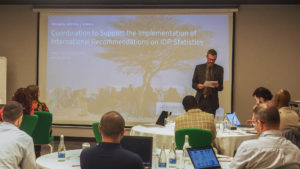Somalia as a nation, continues to face multiple challenges in finding durable solutions for the estimated 3 million Internally Displaced Persons (IDPs) who have been forced to flee their homes due to armed conflict and disasters (Source: GRID 2021). Over the past years, the national and local authorities have taken important steps to better address both root causes and consequences of displacement, supported by humanitarian, development, peace, and state building actors.
This has included efforts at the State level, such as a collaborative profiling exercise implemented in 2015-2016 with support from JIPS, to generate a shared baseline on Internal Displacement in Mogadishu. The profiling results later informed the National Durable Solutions Strategy 2020-2024. Other strong political commitments at the federal level include the creation of the Durable Solutions Secretariat in 2019 that gathers 14 government institutions and provides technical expertise and high-level strategic guidance on Durable Solutions; and by making durable solutions for long-term displacement a cross-cutting imperative and priority of the strategy framework of the National Development Plan 9 (NDP-9).

Working session with Justin McDermott (Deputy Regional Director, IOM Regional Office for the East and Horn of Africa) at the Somalia-JIPS/EGRISS technical meeting in Nairobi, August 2022
The Government of Somalia addresses internal displacement through a robust legal framework, and internal displacement is also a priority of the current National Development Plan 9 (2020-2024). Additionally, there are dedicated national frameworks responding to refugees’ and IDPs’ needs, and international frameworks guiding the field of statistics in Somalia as well as their own Statistical Act (2020).
“The inclusion of the durable solutions agenda in national and local development plans and investments for instance, has led to an evolution of the Somali institutional framework. Anchoring the work on durable solutions within Somalia’s Social Development priorities has also created an enabling environment that can support more innovative and impactful durable solutions initiatives.”
– ReliefWeb, on the Somalia National Durable Solutions Strategy (2020 – 2024)
In a similar vein, the Somalia National Bureau of Statistics (SNBS) is currently working to include IDPs in the update of the country’s National Strategy for the Development of Statistics (NSDS) for 2022-2023. For this purpose, in May 2021 the SNBS requested the support from the Expert Group on Refugee, IDP and Statelessness Statistics (EGRISS) to implement the International Recommendations on IDP Statistics (IRIS) and to develop a stand-alone IDP Statistics Sector Strategic Plan. JIPS is leading on the technical support provision on behalf of the EGRISS.
Somalia’s data ecosystem on Internal Displacement currently mainly relies on data from UN, international and national non-governmental actors. Available data systems mostly focus on informing humanitarian response and programming, for instance by estimating stocks, tracking flows, measuring progress towards Durable Solutions, and assessing needs. While initiatives are underway to strengthen the data landscape, including the UN-led IDP Working Group that also involves several EGRISS members (UNHCR, IOM, OCHA, IDMC), the efforts by SNBS supported by JIPS on behalf of EGRISS aim to inform a more coherent and nationally owned national statistical system (NSS) on IDPs. Including Internally Displaced Persons in the NSDS will not only increase their visibility in statistics but importantly strengthen the evidence based for inclusive public policy design and national responses to displacement in the long term.
Following a series of exchanges and consultations between EGRIS Subgroup 2 on capacity development, the SNBS, and in-country teams from the international community, a technical meeting was organised by JIPS and EGRISS on 1-2 August 2022 in Nairobi. The meeting was attended by representatives from JIPS and the EGRISS Secretariat, SNBS, and regional and country teams from UNHCR, IOM, OCHA, ReDSS, UNDP, REACH Initiative, UNFPA, and UNICEF. It generated a shared understanding of the IRIS and of the existing data ecosystem on Internal Displacement in Somalia, and fostered a discussion on how the international community can best support government-owned statistics on the phenomenon.
“We were grappling with how to generate statistics on IDPs [and] were pleased to see that there is an international effort to help address this gap. The most critical value that JIPS and EGRISS bring is [their] convening power: you have brought together the different actors working on IDP statistics and data in Somalia. […] IDPs play a big role in Somalia’s development and humanitarian situation. [… JIPS and EGRISS support contributes to] a coherent framework and outputs related to IDP [data and statistics].”
– Sharmarke Farah, Director General of the SNBS, during the technical meeting in August 2022
The JIPS-EGRISS coordination meeting held in August 2022 in Nairobi, marks an important step in the ongoing process of EGRISS’ support to the Government of Somalia. Moving forward, JIPS on behalf of EGRISS will continue to provide technical and capacity development support to the SNBS and other key government counterparts in Somalia working on Internal Displacement.
Concrete next steps include a joint follow-up workshop together with the SNBS, to further raise awareness of the IRIS among key government actors and to identify opportunities for government-led data sources that can inform official statistics. We will also support the SNBS to include IDPs in upcoming data collection exercises, such as the MICS survey in 2023 and the census in 2024.
ABOUT EGRISS
The Expert Group on Refugee, Internally Displaced Persons, and Statelessness Statistics (EGRISS) is a multi-stakeholder group established in 2016 by the UN Statistical Commission. Since its establishment, the group’s members -currently including 52 national statistical offices and 28 regional and international organizations- have been working collaboratively to develop and support the implementation of international statistical standards on refugees, IDPs and stateless populations.
The EGRISS’ ultimate goal is to enable informed policy and decision making on forced displacement through the use of high-quality, harmonized official statistics on these population groups and to improve the availability of official statistics on forced displacement through their inclusion into national statistical production.